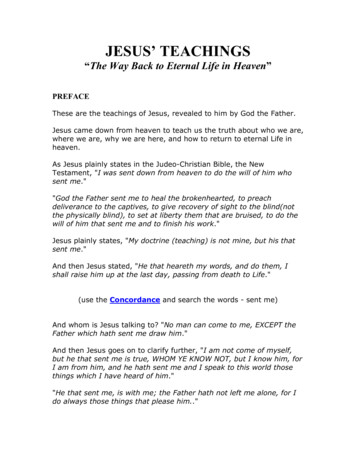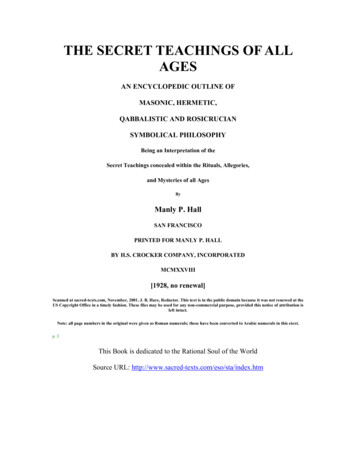
Transcription
TEACHINGS AND PRACTICES OF JUDAISMContentsJewish Tradition Covenant The Rabbis and the Talmud Spirit and Letter of Jewish Law Ritual and Ethical Teachings The Central Commandment to Love Sholom Aleichem's "The Search"Jewish Belief and Behavior Responsibility for Humanity Tzedakah Salvation Chosenness Sin and RepentanceJewish Worship and Practice Prayer Holidays Life-Cycle Events Diversity in JudaismJewish TraditionCovenantIn order to understand Judaism, it is important to recognize the importance ofthe covenant or agreement between God and the Jewish people that forms theframework of Jewish belief and practice. Perhaps the easiest and most obviousway to discuss the covenant is to study the text of the Torah that introduces30
Teachings and Practices of Judaism 31the parameters of the agreement between God and the Jews. (See attachedexcerpts.)One way to introduce the idea of covenant is to distribute copies of thebiblical excerpts to the class and have the students create a list of thoseessential beliefs of Judaism that are based on the Torah passages. The students can then share their conclusions with other members of the class. Thediscussion should include references to the following:1. Covenant is a mutual agreement, which means that both sides acceptthe terms and agree to certain actions. It is initiated by God and accepted byhuman beings.2. Central to the biblical covenant are God's promises of the land ofCanaan (e.g., Gen. 12:1, 13:17) to the descendants of Abraham, of the statusof nationhood or peoplehood conferred upon those numerous descendants(Gen. 12:2, 13:15-16, 17), that the covenant is everlasting (Gen. 17), of thestatus of the people as a holy nation (Exod. 19:1-6), and God's liberation ofthe people from slavery (Exod. 19).3. The responsibilities of the descendants of Abraham include thecircumcision of every male as a sign of participation in the covenant (Gen.17), to refrain from idolatry or the worship of any other gods (Exod. 20, Lev.19), not to swear falsely in God's name (Exod. 20, Lev. 19), to keep theSabbath holy (Exod. 20, Lev. 19), to honor one's father and mother (Exod. 20,Lev. 19), not to murder (Exod. 20, Lev. 19), not to steal or covet the thingsthat belong to others (Exod. 20, Lev. 19), not to lie, especially when one isacting as a witness (Exod. 20, Lev. 19), to observe rules of ritual purity (Lev.19), to give to the needy (Lev. 19), not to abuse the deaf or blind (Lev. 19), torevere God, judge fairly, not hate others, not take vengeance, love yourneighbor, show deference to the aged, take care of strangers, and keep all ofthese commandments (Lev. 19).4. One key feature of the Jewish covenant is the interconnection ofritual and morality in the commandments or laws given by God. Thus acommandment about taking care of other people is followed by a commandment about the proper way to weave cloth, which is followed by a commandment to respect one's elders, which is then followed by a commandment tokeep the Sabbath.Understanding Judaism means understanding that these different typesof rules constitute an organic whole; they are of a single piece. Any depictionof Judaism as a religion solely of ritual laws that are devoid of meaning ishighly inaccurate.The Rabbis and the TalmudThe Talmud, a Hebrew term that means study, is a large collection of rabbinicinterpretation and commentary on the Hebrew Bible. This interpretive
32 ClJEEP Curriculum GuideExcerpts from the TorahGenesis 12:1-7The Lord said to Abram, "Go forth from your nativeland and from your father's house to the land that I willshow you. I will make of you a great nation, and I willbless you; I will make your name great, and you shall bea blessing. I will bless those who bless you and curse himthat curses you; And all the families of the earth shallbless themselves by you."Abram went forth as the Lord had commandedhim, and Lot went with him. Abram was seventy-fiveyears old when he left Haran. Abram took his wife Saraiand his brother's son Lot, and all the wealth that theyhad amassed . . . and they set our for the land ofCanaan.When they arrived in the land of Canaan . . . theLord appeared to Abram and said, "I will give this landto your offspring."And he built an altar there to the Lord who hadappeared to him.Genesis 13:14-17And the Lord said to Abram, after Lot had parted fromhim, "Raise your eyes and look out from where you are,to the north and south, to the east and west, for I giveall the land that you see to you and your offspringforever. I will make your offspring as the dust of theearth, so that if one can count the dust of the earth,then your offspring too can be counted. Up, walk aboutthe land, through its length and breadth, for I give it toyou."Genesis 17When Abram was ninety-nine years old, the Lordappeared to Abram and said to him, "I am El Shaddai[God Almighty]. Walk in My ways and be blameless. Iwill establish My covenant between Me and you, and Iwill make you exceedingly numerous."Abram threw himself on his face; and God spoke tohim further, "As for Me, this is My covenant with you:You shall be the father of a multitude of nations. Andyou shall no longer be called Abram, but your nameshall be Abraham [father of a multitudej, for I make youthe father of a multitude of nations. I will make youexceedingly fertile, and make nations of you; and kingsshall come forth from you. I will maintain My covenantbetween Me and you, and your offspring to come, as aneverlasting covenant through the ages, to be God to youand your offspring to come. I give the land you sojournin to you and your offspring to come, all the land ofCanaan, as an everlasting possession. I will be theirGod."God further said to Abraham, "As for you, you andyour offspring to come throughout the ages shall keepMy covenant. Such shall be the covenant between Meand you and your offspring to follow which you shallkeep: every male among you shall be circumcised. Youshall circumcise the flesh of your foreskin, and that shallbe the sign of the covenant between Me and you. Andthroughout the generations, every male among you shallbe circumcised at the age of eight days. As for thehomeborn slave and the one bought from an outsiderwho is not of your offspring, they must be circumcised,homeborn and purchased alike. Thus shall My covenantbe marked in your flesh as an everlasting pact. And ifany male who is uncircumcised fails to circumcise theflesh of his foreskin, that person shall be cut off from hiskin; he has broken My covenant."And God said to Abraham, "As for your wife Sarai,you shall not call her Sarai, but her name shall be Sarah[princess]. I will bless her; indeed, I will give you a sonby her. I will bless her so that she shall give rise tonations; rulers of peoples shall issue from her."Abraham threw himself on his face and laughed, ashe said to himself, "Can a child be bora to a man ahundred years old, or can Sarah bear a child at ninety?"And Abraham said to God, "Oh that Ishmael mightlive by Your favor!" God said, "Nevertheless, Sarah yourwife shall bear you a son, and you shall name him Isaac[to laugh]; and I will maintain My covenant with him asan everlasting covenant for his offspring to come. As forIshmael, I have heeded you. I hereby bless him. I will
Teachings and Practices of Judaism 33make him fertile and exceedingly numerous. He shall bethe father of twelve chieftans, and I will make of him agreat nation. But My covenant I will maintain with Isaac,whom Sarah shall bear to you at this season next year."And when He was done speaking with him, Godwas gone from Abraham. Then Abraham took his sonIshmael, and all his homeborn slaves and all those hehad bought, every male in Abraham's household, and hecircumcised the flesh of their foreskins on that very day,as God has spoken to him.Exodus 19:1-6On the third new moon after the Israelites had goneforth from the land of Egypt, on that very day, theyentered the wilderness of Sinai . . . Israel encampedthere in front of the mountain, and Moses went up toGod.The Lord called to him from the mountain, saying,"Thus shall you say to the house of Jacob and declare tothe children of Israel: 'You have seen what I did to theEgyptians, how I bore you on eagles' wings and broughtyou to Me. Now then, if you will obey me faithfully andkeep my covenant, you shall be My treasured possessionamong all the peoples. Indeed, all the earth is Mine, butyou shall be to Me a kingdom of priests and a holynation.' These are the words that you shall speak to thechildren of Israel."Exodus 20God spoke all these words, saying: "I the Lord am yourGod who brought you out of the land of Egypt, thehouse of bondage: You shall have no other gods besidesMe."You shall not make for yourself a sculpturedimage, or any likeness of what is in the heavens above oron the earth below, or in the waters under the earth.You shall not bow down to them or serve them. For Ithe Lord your God am an impassioned God, visiting theguilt of the fathers upon the children, upon the thirdand upon the fourth generations of those who reject Me,but showing kindness to the thousandth generation ofthose who love Me and keep My commandments."You shall not swear falsely by the name of theLord your God; for the Lord will not clear one whoswears falsely by His name."Remember the sabbath day and keep it holy. Sixdays you shall labor and do all your work, but theseventh day is a sabbath of the Lord your God: you shallnot do any work—you, your son or daughter, your maleor female slave, or your cattle, or the stranger who iswithin your settlements. For in six days the Lord madeheaven and earth and sea, and all that is in them, andHe rested on the seventh day; therefore the Lordblessed the sabbath day and hallowed it."Honor your father and mother, that you may longendure on the land which the Lord your God is givingyou."You shall not murder."You shall not commit adultery."You shall not steal."You shall not bear false witness against yourneighbor."You shall not covet your neighbor's house: youshall not covet your neighbor's wife, or his male orfemale slave, or his ox or his ass, or anything that is yourneighbor's."Leviticus 19 (The Holiness Code)The Lord spoke to Moses, saying: "Speak to the wholeIsraelite community and say to them: 'You shall be holy,for I, the Lord your God, am holy. You shall eachrevere his mother and his father, and keep My sabbaths:I the Lord am your God.'"Do not turn to idols or make molten gods foryourselves: I the \x rd am your God.'"When you sacrifice an offering of well-being to theI ord, sacrifice it so that it may be accepted on yourbehalf. It shall be eaten on the day you sacrifice it, or onthe day following; but what is left by the third day mustbe consumed in fire. If it should be eaten on the thirdday, it is an offensive thing, it will not be acceptable.And he who eats of it shall bear his guilt, for he hasprofaned what is sacred to the Lord; that person shall becut off from his kin.'"When you reap the harvest of your land, you shallnot reap all the way to the edges of your field, or gatherthe gleanings of your harvest. You shall not pick yourvineyard bare, or gather the fallen fruit of your vineyard;you shall leave them for the poor and the stranger: I amthe Lord your God.'"You shall not steal; you shall not swear deceitfullyor falsely with one another. You shall not swear falselyby My name, profaning the name of your God: I am the
34 CIJEEP Curriculum GuideLord.'"You shall not defraud your neighbor. You shallnot commit robbery. The wages of a laborer shall notremain with you until morning. You shall not insult thedeaf, or place a stumbling-block before the blind. Youshall fear your God: I am the Lord.'"You shall not render an unfair decision: do notfavor the poor or show deference to the rich; judge yourneighbor fairly. Do not deal basely with [or go about asa talebearer among] your fellows. Do not profit by theblood of your neighbor. I am the Lord.'"You shall not hate your kinsman in your heart.Reprove your neighbor, but incur no guilt because ofhim. You shall not take vengeance or bear a grudgeagainst your kinsfolk. Love your neighbor as yourself: Iam the Lord.'"You shall observe My laws. You shall not let yourcattle mate with a different kind; you shall not sow yourfield with two kinds of seed; you shall not put on clothfrom a mixture of two kinds of material. If a man hascarnal relations with a woman who is a slave and hasbeen designated for another man, but has not beenredeemed or given her freedom, there shall be anindemnity; they shall not, however, be put to death,since she has not been freed. But he must bring to theentrance of the Tent of Meeting, as his guilt offering tothe Lord, a ram of guilt offering. With the ram of guiltoffering the priest shall make expiation for him beforethe Lord for the sin that he committed; and the sin thathe committed will be forgiven him.'"When you enter the land and plant any tree forfood, you shall regard its fruit as forbidden. Three yearsit shall be forbidden for you, not to be eaten. In thefourth year all its fruit shall be set aside for jubilationbefore the Lord; and only in the fifth year may you useits fruit—that its yield to you may be increased: I theLord am your God.'"You shall not eat anything with its blood. Youshall not practice divination or soothsaying. You shallnot round off the side-growth on your head, or destroythe side-growth of your beard. You shall not makegashes in your flesh for the dead, or incise any marks onyourselves: I am the Lord.'"Do not degrade your daughter and make her aharlot, lest the land fall into harlotry and the land befilled with depravity. You shall keep My sabbaths andvenerate My sanctuary: I am the Lord.'"Do not turn to ghosts and do not inquire offamiliar spirits, to be defiled by them: I the Lord amyour God.'"You shall rise before the aged and show deferenceto the old; you shall fear your God: I am the Lord.'"When a stranger resides with you in your land,you shall not wrong him. The stranger who resides withyou shall be to you as one of your citizens; you shall lovehim as yourself, for you were strangers in the land ofEgypt: I the Lord am your God.'"You shall not falsify measures of length, weight, orcapacity. You shall have an honest balance and honestweights. I the Lord am your God who freed you fromthe land of Egypt. You shall faithfully observe all Mylaws and all My rules: I am the Lord.'"
Teachings and Practices of Judaism 35tradition is called the "Oral Law" in distinction from the Bible or "WrittenLaw." Both are considered sacred in Judaism, and the interpreters of theTalmud are believed to be divinely inspired.A survey of the Talmud reveals great room for disagreement among thesages who interpreted and commented upon the Hebrew Bible. This traditionhas provided a sanction and a rationale for disagreement within Judaism.For example, some rabbis believe that generosity and kindness are worthas much as the fulfillment of all of the other commandments of the Torah(Tosefta, Peak IV. 18). Other rabbis believe peace is the paramount virtue andinsist that even if Jews commit idolatry, if they live in peace, they cannot bejudged (Pesikta Rabbatai). Still others maintain that human pride is equivalentto idolatry and proud individuals are as sinful as if they had denied God(Sotah 4b).But the rabbis of the Talmud agree that all things are contained in theTorah: "Turn it and turn it again, for everything is in it." The topics coveredin the Talmud are wide-ranging, from how to treat animals to precise rulesabout inheritance; from how to treat other human beings including the poor,widowed, and orphaned, to laws about war; from laws about property anddebt to laws about truthful witnesses in a court.Spirit and Letter of Jewish LawJewish law, drawn from the instructions given by God in the Hebrew Bible, isthe product of centuries and centuries of debate and discussion amongrabbinic interpreters. Halakhah, which means to walk, is the Hebrew term forJewish law, and halakhah makes up a significant part of the Talmud.Halakhah is the interpretation and practical application of biblicalcommandments to everyday life. Jewish tradition constantly interprets and reinterprets the Bible to discern its authentic meanings. In this sense, Judaism ismore than the "Old Testament."Pivotal to understanding Jewish law is an awareness that the letter of thelaw, as found in the Hebrew Bible, is reinterpreted to be in harmony with itsinner spirit. Many of the harsher commandments in the Torah were deprivedof legal force by an underlying spirit of humanity that was often expounded bythe rabbis in the Talmud.The best known example is how the rabbis interpreted "an eye for aneye" (Exod. 21:24, Lev. 24:19) to mean "the value of an eye for an eye," thuseliminating any possibility or justification for physical retaliation. This type ofinterpretation is based upon the rabbinic conviction that God is merciful andgracious and thus God's laws must be read and understood in the light ofmercy.
36 C/JEEP Curriculum GuideRitual and Ethical TeachingsRitual and ethical teachings in Judaism are profoundly interconnected, of apiece, and cannot be fully understood in isolation. Jewish law covers bothritual—for example, celebrating holidays, keeping the dietary laws, observingthe Sabbath—and ethics—for example, the proper treatment of strangers,neighbors, relatives, the poor, the elderly, the powerless.The ideal in Judaism is to fulfill both the ritual and the moral law, butthe rabbis acknowledged that there are differences among the various andnumerous laws, describing some as "heavier" and some as "lighter" and givingprecedence to the moral laws over the ceremonial.According to rabbis Ben Azzai, Akiba, and Tahuma, the unity of humankind and the love of neighbor are considered the greatest and most inclusiveprinciples of the law (Genesis Rabbah, Bereshit, 24:7). One of the highest goalsin Judaism is the combination of doing and study: "And thou shall makeknown to them the way wherein they must walk and the work they must do"(Exod. 28:20). Rabbi Joshua said: "The Way" is the study of Torah andTalmud and "The Work" is good deeds (Mekilta, Amalek Yitro).The Central Commandment to LoveThere is a story about a gentile who came to Hillel and arrogantly said, "Youmay convert me if you can teach me the whole Torah while standing on onefoot." Hillel converted him by saying "Do not do to your fellow what you hateto have done to you. This is the Torah in its entirety, the rest is explanation.Go and learn" (Sabbath 31a).For thousands of years the rabbis have commented on these passages inthe Hebrew Bible: "You shall not hate your brother in your heart. . .You shalllove your neighbor as yourself (Lev. 19:17-18). The Talmud teaches that aconsequence of the commandment "You shall love the Lord your God"(Deut. 6:4) is the commandment "You shall love your neighbor as yourself(Lev. 19:18). Lest this be misunderstood to refer only to Jewish obligations tolove other Jews, the same chapter contains the additional command, "Youshall love the stranger as yourself (Lev. 19:34).The rabbis carefully and systematically defined this obligation. Theproperty and good name of another should be as precious as one's own. Andthis principle is applied to the laws of trade and competition in business aswell as to slander and defamation.According to the Talmud, God said to Israel: "My children, have I madeyou lack anything? What is it I seek of you? Only that you love each other,honor each other and respect each other: that there not be found among youeither sin or theft or anything ugly, that you never become soiled or base."
Teachings and Practices of Judaism 37Sholom Aleichem's "The Search"The goal of this exercise is to introduce students to Jewish literature as avehicle for communicating Jewish ethical ideals and to illustrate the application of Talmudic principles to life situations.The story is a short one, so it is possible to have the students read it as ahomework assignment, have them read it silently in class, or read it aloud inclass. Prior to reading the story, certain concepts should be explained: YomKippur, the Jewish Day of Atonement, the value of study as a holy act, andthe Yiddish words sprinkled throughout the story.Biographical notes: Sholom Aleichem is the pen name of ShalomRabinowitz, who was born in Kiev, Ukraine, in 1859 and died in 1916 in NewYork City. His name means "peace be unto you" in Hebrew and is a traditional Jewish greeting.He writes about the internal life of East European Jewry in the semighetto of the Pale of Settlement, an area in which Jews were forced to liveand were subject to robberies, discrimination, humiliation, expulsions, andoccasional massacres and were forbidden to own land. The Russian law wasthat everything is forbidden to Jews except that which is specifically permitted.As the attached story illustrates, Jewish writers like Sholom Aleichemwere intensely concerned with morality and behavior and, as a result, wereextremely critical of their fellow Jews.Students may have some difficulty with the story. Solicit their commentsand questions. The students' focus should be on understanding the unhappiness of the rabbi at the end of the story, with reference to the followingTalmudic citations:To put your neighbor to shame is among the gravest of sins, according torabbinic ethics. Rabbi Simeon ben Yochai said: "It is better for a man to fallinto a burning oven than to put his neighbor to shame in public" (Sotah 10b).Someone came before Rabbi Nachman ben Isaac and taught: "If a man putshis neighbor to shame in public, it is as if he shed blood." Rabbi Nachmansaid to him: "You have spoken well, for we see how the red disappears andthe pallor comes [to the face of one who has been shamed]" (Baba Mezia'58b).Jewish Belief and BehaviorResponsibility for HumanityThe command "You shall not stand idly by the blood of your neighbor" (Lev.19:15) is explained in the Talmud: One is obligated to testify in behalf of anyperson if one knows anything of value or help to that person's case; it is not
38 C/JEEP Curriculum GuideTHE SEARCHSholom Aleichem"Now, listen to me," said a man with round bovineeyes, who had been sitting in a corner by the window,smoking and taking in stories of thefts, holdups, andexpropriations. "I'll tell you a good one, also about atheft, which happened in my town, in the synagogueof all places, and on Yom Kippur too! You'll like it."Our Kasrilevke—that's where I come from—is asmall town and a poor one. We have no thieves andno stealing, for there is nobody to steal from andnothing to steal. And aside from all that, a Jew justisn't a thief. I mean to say, even if a Jew is a thief, heis not the kind of thief who sneaks in through awindow or goes at you with a knife. He may twist youand turn you, outtalk you and outsmart you—granted; but he won't crawl into your pockets, he won't becaught red-handed and led down the street in disgrace. That may happen to a thieving Ivan but not toa Jew. Imagine, then, someone stealing in Kasrilevke,and quite a bit of money too—eighteen hundredrubles at one stroke!One day a stranger arrived in our town, a Jew,some sort of contractor from Lithuania. He appearedon the evening of Yom Kippur, just before the timefor prayer. He left his bundle at the inn and hurriedout to look for a place to pray and found the oldsynagogue. He arrived in time to attend the eveningprayer and ran into the trustees with their collectionbox."Sholom aleichem!""Aleichem sholom!""Where are you from?""From Lithuania.""And what's your name?""What difference does that make to your grandmother?""Well, after all, you've come to our synagogue!""Where else do you want me to go?""You surely want to pray here?""Have I any choice?""Then put something in the box.""Of course. Did you think I was going to pray fornothing?"Our stranger took three silver rubles out of hispocket and put them in the box. Then he put a rublein the cantor's plate, gave a ruble for the rabbi,another for the school, and threw half a ruble intothe poor box; in addition, he handed out coins to thebeggars standing at the door—we have so many poorpeople in our town, God bless them, that if you reallywent at it you could distribute Rothschild's fortuneamong them.When we saw the kind of stranger he was wegave him a place right at the east wall. You will askhow one could be found for him when all the placeswere occupied. Some question! Where does one finda place at a celebration—a wedding, say, or a circumcision feast—after all the guests have been seated atthe table and suddenly there is a commotion—therich guest has arrived! Well, all the others squeezetogether until a place is made for the rich man. Jewshave a habit of squeezing—when no one else squeezes us, we squeeze one another."The round-eyed man paused for a moment,looked at the audience to see what impression hisquip had made, and resumed his tale.In short, the stranger occupied a place of honor.He asked the shammes for a prayer stand and,donning his cloak and prayer shawl, began to pray.Bending over his stand, he prayed and prayed, alwayson his feet, never sitting down, let alone lying down.He did not leave his stand for a minute, that Litvak,except when the Eighteen Blessings were recited andeveryone had to face the Ark, and during the kneeling periods. To stand on one's feet on a day offasting without ever sitting down—only a Litvak cando that.After the shofar was blown for the last time, andChaim-Chune the teacher, who always conducts thefirst night prayer after the holiday, began to chant,"Ha-mai-riv a-a-arovim," we suddenly heard a cry,"Help, help, help!" We looked around and saw thestranger lying on the floor in a faint. We pouredwater on him to bring him to, but he fainted again.
Teachings and Practices of Judaism 39What had happened? A fine thing! He had onhim—the Litvak, that is—eighteen hundred rubles;and he had been afraid, so he said, to leave hismoney at the inn. You think it's a trifle, eighteenhundred rubles? To whom could he entrust such asum in a strange town? Nor did it seem right to keepit in his pocket on Yom Kippur. So, after thinkingthe matter over, he decided quietly to slip the moneyinto his stand—yes, a Litvak is quite capable of sucha thing! Now do you understand why he did not leavehis stand for a minute? Someone had apparentlysnatched his money during the Eighteen Blessings orone of the kneeling periods.In short, he screamed, he wept, he lamented—what would he do now without the money? It was,he said, someone else's, not his, he was only anemployee in some office, a poor man, burdened withmany children. All he could do now, he said, was tojump into the river or hang himself right here in thesynagogue in front of everybody.On hearing such talk the whole congregationstood paralyzed, forgetting that they had been fastingfor twenty-four hours and were about to go home toeat. It was a disgrace before a stranger, a shamefulthing to witness. Eighteen hundred rubles stolen, andwhere? In a place of worship, in the old synagogue ofKasrilevke! And when? On Yom Kippur! Such athing was unheard of."Shammes, lock the door!" our rabbi ordered.We have our rabbi—his name is Reb Yosefel—a trueand pious Jew, not ovcrsubtle but a kindly soul, aman without gall, and sometimes he has brilliantideas, such as wouldn't occur even to a man witheighteen heads! When the door was locked the rabbiaddressed the congregation. His face was white as thewall, his hands were trembling and his eyes burning."Listen carefully, my friends," he said. "This is anugly business, an outrage, unheard of since thecreation of the world, that in our town, in Kasrilevke,there should be such an offender, such a renegadefrom Israel, who would have the impudence to takefrom a stranger, from a poor man, a supporter of afamily, such a large sum of money. And when? On aholy day, on Yom Kippur, and perhaps even duringthe closing prayer! Such a thing has been trulyunheard of since the creation of the world! I can'tbelieve such a thing is possible, it just can't be!Nevertheless—who can tell?—some wretched manwas perhaps tempted by this money, particularly sinceit amounted to such a fortune. The temptation, Godhave mercy on us, was great enough. So if it wasdecreed that one of us succumb to the temptation—if one of us has had the misfortune to commit sucha sin on a day like this—we must investigate thematter, get to the bottom of it. Heaven and earthhave sworn that truth must come to the top like oilon water, so we must search each other, go througheach other's garments, shake out the pockets ofeveryone here—from the most respectable memberof the congregation to the shammes, sparing no one.Begin with me: here, my friends, go through mypockets!"Thus spoke our rabbi, Reb Yosefel, and he wasthe first to open his caftan and turn all his pocketsinside out. After him, all the members of the congregation loosened their girdles and turned out theirpockets, and each of them in turn was searched, andfelt all over, and shaken out. But when they came toLaizer Yosl he turned all colors and began to argue.The stranger, he said, was a swindler; the whole thingwas a Litvak's trick, no one had stolen any moneyfrom him. "Can't you see," he said, "that the wholething is a lie, a fraud?"The congregation broke out in loud protests."What do you mean?" they said. "Respectablecitizens have submitted to a search—why should yoube excepted?" The whole crowd clamored, "Searchhim, search him!"Laizer Yosl saw things were going badly for him,and he began to plead with tears in his eyes, beggingthat he be spared. He swore by every oath: may hebe as pure of all evil as he was innocent of stealing.And on what grounds was he to be spared? Hecouldn't bear the disgrace of being searched, he said,and implored the others to have pity on his youth,not to subject him to such an indignity. Do anythingyou
Understanding Judaism means understanding that these different types of rules constitute an organic whole; they are of a single piece. Any depiction of Judaism as a religion solely of ritual laws that are devoid of meaning is highly inaccurate. The Rabbis and the Talmud The Talmud, a Hebrew
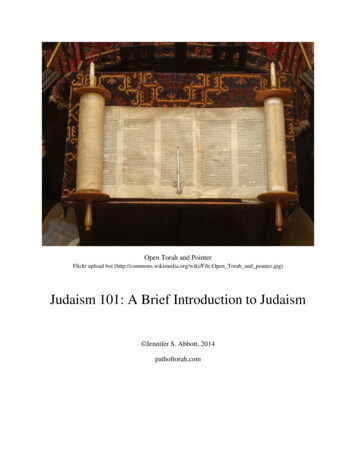
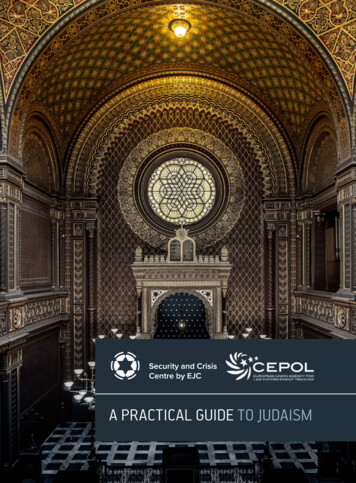
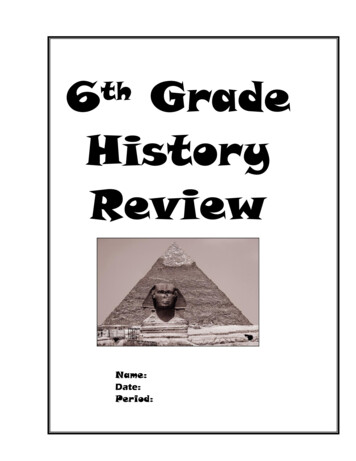
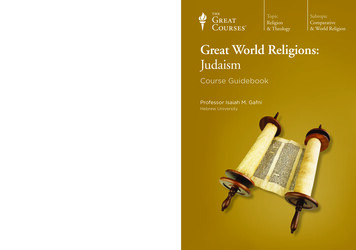
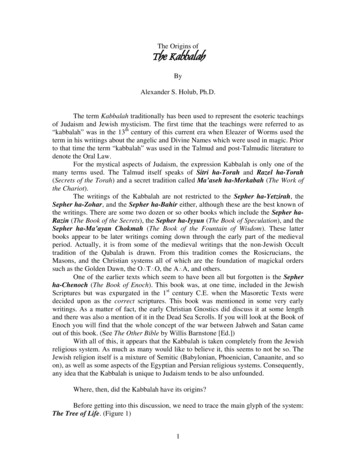


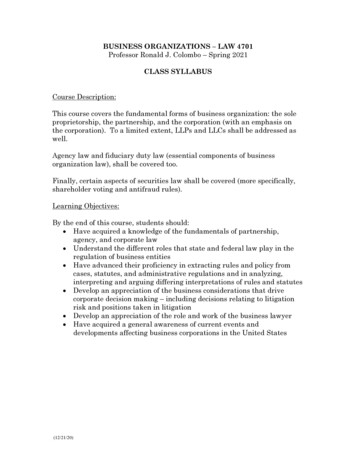
![[Goodman Martin] Judaism in the Roman World](/img/16/goodman-2007.jpg)
